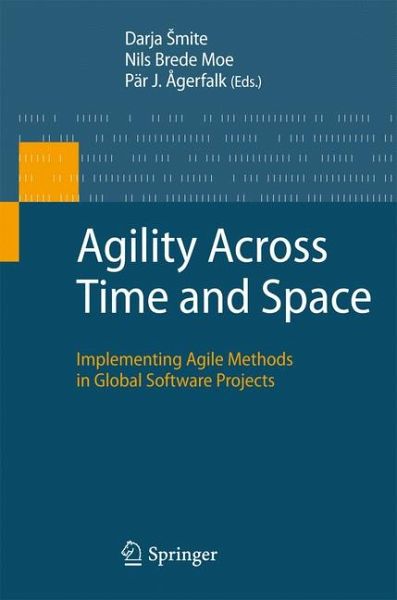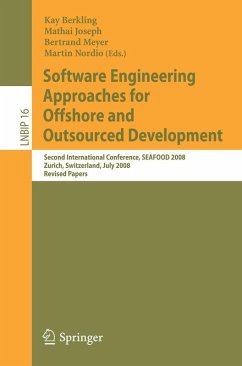
Agility Across Time and Space (eBook, PDF)
Implementing Agile Methods in Global Software Projects
Redaktion: Smite, Darja; Ågerfalk, Pär J.; Moe, Nils Brede
Versandkostenfrei!
Sofort per Download lieferbar
40,95 €
inkl. MwSt.
Weitere Ausgaben:

PAYBACK Punkte
20 °P sammeln!
Rather than deciding whether or not to get involved in global sourcing, many companies are facing decisions about whether or not to apply agile methods in their distributed projects. These companies are often motivated by the opportunities to solve the coordination and communication difficulties associated with global software development. Yet while agile principles prescribe close interaction and co-location, the very nature of distributed software development does not support these prerequisites. smite, Moe, and Ågerfalk structured the book into five parts. In "Motivation" the editors intro...
Rather than deciding whether or not to get involved in global sourcing, many companies are facing decisions about whether or not to apply agile methods in their distributed projects. These companies are often motivated by the opportunities to solve the coordination and communication difficulties associated with global software development. Yet while agile principles prescribe close interaction and co-location, the very nature of distributed software development does not support these prerequisites. smite, Moe, and Ågerfalk structured the book into five parts. In "Motivation" the editors introduce the fundamentals of agile distributed software development and explain the rationale behind the application of agile practices in globally distributed software projects. " Transition" describes implementation strategies, adoption of particular agile practices for distributed projects, and general concepts of agility. "Management" details practical implications for project planning, time management, and customer and subcontractor interaction. "Teams" discusses agile distributed team configuration, effective communication and knowledge transfer, and allocation of roles and responsibilities. Finally, in the "Epilogue" the editors summarize all contributions and present future trends for research and practice in agile distributed development. This book is primarily targeted at researchers, lecturers, and students in empirical software engineering, and at practitioners involved in globally distributed software projects. The contributions are based on sound empirical research and identify gaps and commonalities in both the existing state of the art and state of the practice. In addition, they also offer practical advice through many hints, checklists, and experience reports. Questions answered in this book include: What should companies expect from merging agile and distributed strategies? What are the stumbling blocks that prevent companies from realizing the benefits of the agile approach in distributed environments, and how can we recognize infeasible strategies and unfavorable circumstances? What helps managers cope with the challenges of implementing agile approaches in distributed software development projects? How can distributed teams survive the decisions taken by management and become efficient through the application of agile approaches?
Dieser Download kann aus rechtlichen Gründen nur mit Rechnungsadresse in A, B, BG, CY, CZ, D, DK, EW, E, FIN, F, GR, HR, H, IRL, I, LT, L, LR, M, NL, PL, P, R, S, SLO, SK ausgeliefert werden.












